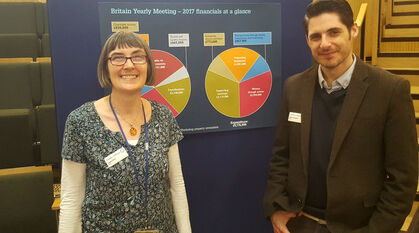Does punishment work?
Home Secretary Priti Patel says she wants criminals to 'literally feel terror at the thought of committing offences'. Quakers have a different approach.

In August 2019 the Home Secretary Priti Patel said she wants criminals to 'literally feel terror at the thought of committing offences'.
Quakers have a different approach. The Quaker Social Justice subcommittee I work with questions the use of fear and punishment and asks, do they fix the underlying causes of crime?
Problems with fear and punishment
Quakers focus on that of God in all people. We need to have structures which respect this; we don't want a society, or the systems within it, to be based on fear. A fear-based punishment system with a command-and-control mentality does not encourage responsible citizenship or government.
We ask, does punishment ever work? We see in the news examples where fear is used as a means to control people, such as the suppression of protest in Hong Kong. Punishment may have a deterrent effect on some who are breaking the law there, but often we see the strength of protest increase.
In practice, fear of punishment in the UK does not seem to be preventing either first time or repeated offences. The opposite happens – punishing and imprisoning people tends to expose them to environments where new types of harms grow.
When those with power and privilege reinforce a culture of fear, it sends the message that causing harm to others is legitimate – or even preferable.
What works better than punishment?
The Quaker subcommittee uses the phrase 'those who have caused harm' rather than 'offender' or 'criminal'. Similarly, instead of the term 'victim', they use the phrase 'those who have been harmed'. This use of language puts the focus on harm done and avoids words that can label people negatively. Our experience of developing the organisation Circles of Support and Accountability, for those who have used sex to harm others, taught me that using words that dehumanise and isolate people do not prevent harms being repeated.
Through our work in Rwanda and the West Bank, Quakers are encouraged by new and creative initiatives developed by those who have direct experience of harm. We find that both those who have been harmed and those who have harmed can, if asked, identify what would need to happen to prevent harm reoccurring. Their responses are often surprisingly similar. They refer to having attention paid to their basic needs and rights. They talk about being seen as a whole person.
Restorative justice is one such practice that has become mainstream in parts of the British criminal justice system. It enables those who have been harmed to ask difficult questions of those who have harmed them.
The police are now paying for some restorative justice services as part of their care of victims, where they realise that locking people up does little to help those who have been harmed to live their lives free from fear. This video from Kent police explains their approach:
Pressing play on the video below will set a third-party cookie. Please see our cookies page to find out more.
Originally restorative justice was only used for minor misdemeanours, such as graffiti. However, as expertise in restorative justice grows, increasingly complex and serious harms are being handled in this way. Where it is well-implemented, restorative justice has transformative effects on the health, safety and lives of individuals and communities.
Rethinking old approaches
Decades of Quaker chaplaincy work in prisons has led us to believe that the containment of individuals is sometimes necessary where public safety is an issue. Such a response does not have to be considered punishment – society can view containment as a secure place, where a different outlook can be grown. Those already practicing such alternative systems, as in Norway, identify empathy-building as central to the development of a change of heart, and changed ideas and actions, in those who have greatly harmed others.
The threat of punishment has little effect in some circumstances, for example, the circumstances of a young person who has decided to carry a knife. They believe that the knife will protect them from harm. Introducing the fear of punishment into their life will not make them feel safer. Rebuilding youth services would be a more productive response to violence of this kind; these services provide young people with immediate safety, while enhancing their long-term life prospects and wellbeing.
We now know that a healthy and peaceful world needs (among other things) to be founded on inclusivity, learning, equality and honesty between individuals, within communities and from those who govern us.
Sustaining positive models of good practice is how we can build public confidence in them, so that we no longer need to frighten and punish each other. The expression of our humanity in acts of understanding, care, and love, can dismantle our inherited reliance on fear that we think we need.


